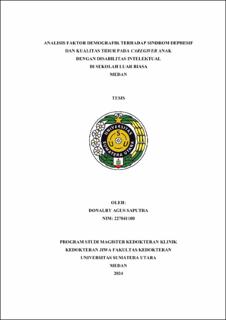| dc.description.abstract | Background: Caregiving is also associated with physical, psychological and financial
burdens experienced by caregivers themselves. The stressors associated with caregiving are
often persistent, uncontrollable and unpredictable. One-third of caregivers also reported high
caregiving burden. Caregiver participation in disability is important, but caregivers with
disabilities can experience symptoms of depression and sleep disturbance.
Methods: This study is a multivariate analytic study of linear regression predictive
framework with a cross-sectional approach on 139 caregivers of children with intellectual
disabilities who attend SLB-E Negeri Pembina at the provincial level on Jalan Karya Ujung,
Medan Helvetia sub-district. Sampling method was obtained by non probability sampling type
consecutive sampling. Data were analyzed with the SPSS program to determine factors that
influence depressive syndrome and sleep quality in caregivers of children with intellectual
disabilities. Data normality test using Kolmogorov-Smirnov test. Data analysis uses Pearson
Correlation test if the data is normally distributed, and Spearman Correlation test if the data is
not normally distributed.
Results: Of the 139 caregivers of children with intellectual disabilities who experienced
depressive syndrome and sleep quality, the median (min-max) age variable was 37 years (22-
59 years). The median (min-max) value of the variable length of education of caregivers of
children with intellectual disabilities is 12 years (9-15 years), and the median (min-max) value
of the variable income of caregivers of children with intellectual disabilities is 2.7 million
(1.5-3.5 million). The gender variable of caregivers was mostly female, 99 people (71.2%).
The most common marital status variable was not married as many as 77 people (55.4%). The
highest value of the employment status variable is not working as many as 70 people (50.4%).
Conclusion:There is an association between depressive syndrome and age, marital status,
income, and employment status of child caregivers with intellectual disability. There is no
association between depressive syndrome and gender and education of child caregivers with
intellectual disability. There is a relationship between sleep quality and age, gender, and
income of child caregivers with intellectual disability. There is no association between sleep
quality and education, marital status, and employment status of child caregivers with
intellectual disability. | en_US |


